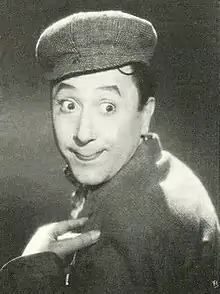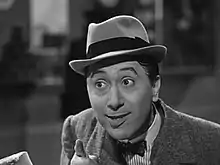Erminio Macario | |
|---|---|
 Macario in the movie Il chiromante | |
| Born | 27 May 1902 Turin, Kingdom of Italy |
| Died | 25 March 1980 (aged 77) Turin, Italy |
| Occupation | Actor |
| Years active | 1933–1975 |
| Spouses |
Giulia Dardanelli
(m. 1938; died 1980) |
| Children | Alberto (1943) Mauro (1947) |
Erminio Macario (27 May 1902 – 25 March 1980), best known as Macario, was an Italian film actor and comedian. He appeared in 42 films between 1933 and 1975.
Life and career
Born in Turin, Macario made his debut at a young age in the amateur dramatics company Don Bosco Oratory in Valdocco,[1] then he was part of some small amateur companies in his hometown until 1924. At this time, he was cast in the company of dancing and pantomime of Giovanni Molasso.[2] Soon after, he entered the company of Wanda Osiris, the undisputed queen of the revue of that time in Italy.[2] Between the two wars he became, in a short time, one of the most popular comedians of the revue theater.[3]
Macario made his film debut in 1933 with Aria di paese, but the success came just six years later with two comedy films directed by Mario Mattoli and co-written by a young Federico Fellini, Imputato alzatevi! and Lo vedi come sei... lo vedi come sei?.[2] After a series of successful comedies directed by Carlo Borghesio since the early fifties, Macario appeared in short characterizations in anthology films and was sidekick of Totò in a number of films.[2] Starting from mid-sixties he finally dedicated to television and theater.[2]

His comical style was referred as a mixture between Chaplin's Charlot and Marx Brothers.[4]
Partial filmography
- Country Air (1933) - Mac
- Defendant, Stand Up! (1939) - Cipriano Duval
- Lo vedi come sei... lo vedi come sei? (1939) - Michele Bernisconi
- The Pirate's Dream (1940) - José
- Non me lo dire! (1940) - Michele Colombelli, marchese di Castel Perrone
- Il chiromante (1941) - Candido
- Il vagabondo (1941) - Pippo, il vagabondo
- Il fanciullo del West (1943) - Mac Carey
- Charley's Aunt (1943) - Terenzio
- Arcobaleno (1943)
- Macario Against Zagomar (1944) - Macario Duplessis
- The Innocent Casimiro (1945) - Casimiro Pelagatti
- L'eroe della strada (1948) - Felice Manetti
- How I Lost the War (1948) - Leo Bianchetti
- Adam and Eve (1949) - Adamo Rossi
- How I Discovered America (1949) - Cristoforo Colombo
- Il monello della strada (1950) - Carletto Po
- The Passaguai Family Gets Rich (1952) - Giocondo Diotallevi
- My Wife, My Cow and Me (1952) - Mario
- I, Hamlet (1952) - Amleto
- Matrimonial Agency (1953) - Peppino
- Carosello del varietà (1955)
- Italia piccola (1957) - Sandrin
- La cambiale (1959) - Tommaso
- Lo smemorato di Collegno (1962) - Nicola Politi
- Toto's First Night (1962) - Mimi Makò
- I 4 monaci (1962) - Fra' Martino
- Sexy Toto (1963) - Mimi Cocco
- Avventura al motel (1963) - Erminio
- Uno strano tipo (1963) - Giovanni
- Totò contro i quattro (1963) - La Matta
- The Monk of Monza (1963) - Fra' Mamozio
- I 4 tassisti (1963) - Pomilio Barone (segment "Caccia al tesoro")
- The Four Musketeers (1963)
- Lisa dagli occhi blu (1970) - Tramp with the cats
- Nel giorno del signore (1970) - Don Giacinto
- The Mighty Anselmo and His Squire (1972) - Frà Prosdocimo Zatterin da' San Donà di Piave
- Ante Up (1974)
- Due sul pianerottolo (1976) - Prof. Luigi Savoia
References
- ↑ Domenico Seren Gay. Teatro popolare dialettale: indagine-enciclopedia sul teatro piemontese. Priuli & Verlucca, 1977.
- 1 2 3 4 5 Gianni Canova (2005). Enciclopedia del cinema. Garzanti, 2009. ISBN 881150516-X.
- ↑ Ennio Fulgheri (1998). Manuale del cinema italiano. Swan, 1998. ISBN 8886464150.
- ↑ Valerio Venturi (2010). Cesare Andrea Bixio. L'attività musicale di Bixio per l'industria cinematografica (1920-1945). Libreria Universitaria, 2010. ISBN 978-8862920223.
Further reading
- Maurizio Ternavasio, Macario: vita di un comico, Lindau, 1998, ISBN 8871802411.